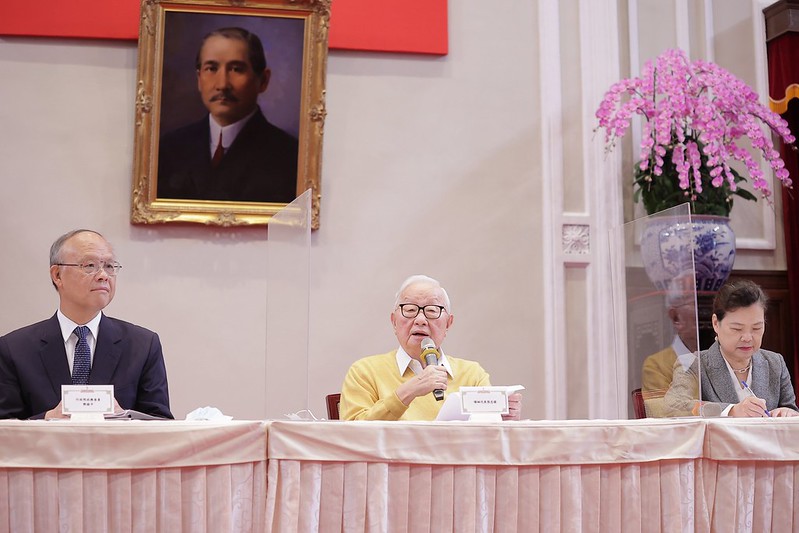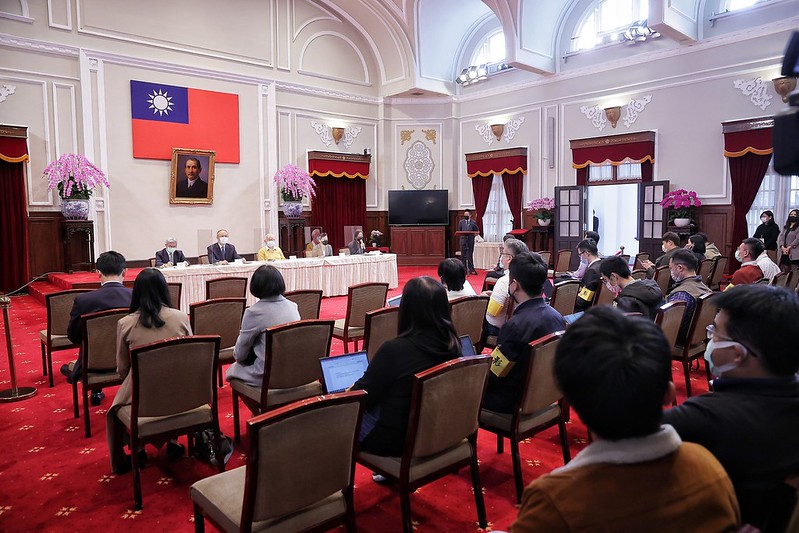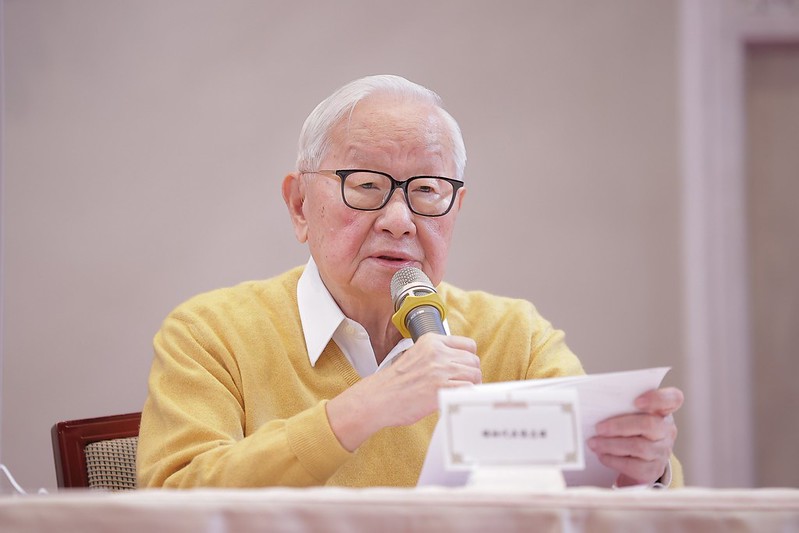News & activities
 News releases
News releases
On the morning of November 13, the Presidential Office held a press conference on the 2021 APEC meetings, including the APEC Economic Leaders' Meeting (AELM) and Ministerial Meetings. Joined by Minister without Portfolio John C. C. Deng (鄧振中), Minister of Economic Affairs Wang Mei-hua (王美花), National Security Council Deputy Secretary-General Hsu Szu-chien (徐斯儉), and Director-General Sharon S. N. Wu (吳尚年) of the Ministry of Foreign Affairs' Department of International Organizations as Senior Official for APEC, Leader's Representative Dr. Morris Chang (張忠謀) briefed the public on the results of this year's APEC meetings and responded to questions from the media.
Dr. Chang discussed the remarks he delivered at the previous day's AELM, a full transcript of which follows:
Prime Minister [Jacinda] Ardern has encouraged us to respond to the question of "How can we work together to accelerate the economic recovery from COVID-19?" Chinese Taipei will respond as follows:
First, COVID-19 is not over yet. The world, including APEC, is still struggling toward what we may consider to be a valid signpost that COVID-19 is behind us: namely, free travel again, without restrictions and quarantines. To get to that signpost, the best medical advice appears to be: sufficiently broad vaccination coverage among the world population. Getting back to APEC, some members do not have enough vaccines while others have surpluses and/or are manufacturers. We believe that the latter should make it easy for the former to obtain sufficient vaccines and implement broad vaccination coverage.
On behalf of Chinese Taipei, I am happy to report that, while I expressed some concern in our special session in July about our vaccine adequacy, that concern has now eased somewhat due to generous donations by the US and Japan, and by several local enterprises and institutions. Also, as perhaps one of the most successful APEC members to control the severity of the pandemic outbreak through digital tools so far, Chinese Taipei repeats our willingness to help other members by sharing our experience with them.
Once we have reached the signpost of free travel, it means we have conquered, or at least neutralized COVID-19. What remains to be our main challenge? Free trade--free trade that is only subject to vital national security needs.
APEC members have thrived during the past several decades through free trade. Chinese Taipei is concerned that, recently, "free trade" seems to carry more conditions and qualifications than it used to. We believe most of those conditions and qualifications are counterproductive. We earnestly believe that free trade, subject to only vital national security needs, is the broad avenue to supply chain resiliency and robust prosperity for each and every APEC member.
Speaking of supply chain resiliency, the recent semiconductor supply bottleneck has often been brought up. The chip shortage is a culmination of an original underestimation of demand, natural disaster, logistical jams, and digital demand spikes.
While a shortage of any critical component is a serious problem, a free market, which includes free trade and free competition, is still the best solution. In fact, the greatly stepped-up building of chip manufacturing capacity in response to the recent chip shortage, is testimony to our belief that the free market is the best solution to shortage or excess problems.
Regional economic integration brings our economic and trade relations closer. Chinese Taipei believes that our economic development depends importantly on APEC regional prosperity. Therefore, we believe in supporting initiatives that deepen economic integration, promote high standards on trade-related rules, and help improve the livelihoods of our people across the Asia-Pacific.
Because of these beliefs, we have applied to join the CPTPP (Comprehensive and Progressive Agreement for Trans-Pacific Partnership), a comprehensive agreement that could generate momentum for the development of the region – liberalizing trade and investment while promoting sustainable growth. Chinese Taipei plays an irreplaceable role in the global high-tech supply chain. We also have a highly transparent market economy, and are able and willing to respect the CPTPP's high standards.
Finally, we thank New Zealand for overcoming all the challenges this year and successfully hosting all the APEC meetings. We believe that the achievements in this year's priority areas will lay the groundwork for the APEC agenda in the future.
We also thank and support the United States' and Peru's offers to host APEC in 2023 and 2024, respectively. We also look forward to the APEC meetings to be hosted by Thailand next year.
Dr. Chang further stated that at this year's AELM, APEC members focused on two important issues, the first of which was vaccines. He said that countries with a vaccine surplus outlined how many doses they have donated and how many they will donate in the future, and noted that APEC members without enough vaccines voiced complaints. Dr. Chang said that Chinese Taipei lies somewhere in the middle, and that while we are not in a position to donate vaccines, the shortage he mentioned in July seems to have eased.
The second issue of common concern, Dr. Chang said, was economic recovery and the question of how to use technology and digitalization to revive our economies in an inclusive way, so that the resulting economic prosperity is not limited to only a minority of people. Other issues discussed included sustainability and climate change.
Dr. Chang then answered questions from the media.
Asked whether other APEC members had responded to his statement during the AELM expressing our desire to join the CPTPP and citing Taiwan's competitive advantages, Dr. Chang said that AELM participants delivered their statements in alphabetical order, with no time allotted in the agenda for responses.
He added that, in regard to our CPTPP accession, he had made clear in his remarks that Chinese Taipei plays an irreplaceable role in global high-tech supply chains, has a highly transparent market economy, and is willing and able to respect the CPTPP's high standards, all of which are strong qualifications for entry.
Dr. Chang was also asked if China had expressed goodwill or sought to clarify its previously stated position that, in order to participate in mechanisms for economic cooperation, Taiwan or Chinese Taipei must do so under the "one China principle." Dr. Chang responded in the negative, saying that China did not bring up the "one China principle" in the meeting.
Dr. Chang was further asked if other leaders had expressed concern about chip shortages or had discussed related issues with him. Dr. Chang responded that none of the other leaders had broached the topic, and that he was the only one to mention it, adding that he brought it up only as a good example of why the free market is the best solution to shortages or oversupply problems. Regarding the chip shortage, Dr. Chang said that, in a free-market environment, the private sector can quickly ramp up production capacity before any government takes action.
Dr. Chang also referred to his statement during the AELM that free trade seems to carry more conditions and qualifications than it used to, citing the US as a longtime free trade advocate which has now suddenly added conditions requiring more domestic production of semiconductors and integrated circuits.











